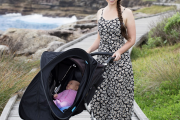Time Outs for Grown-Ups: Manage Your Stress


You’re late for work, the bathroom sink needs a plumber, and your 7-year-old won’t put on his shoes. Parenthood is not for the faint of heart, but it can sure get the heart pounding.
When we’re at our best – well rested, well fed, feeling good and in control – we can respond to whatever life brings us with poise and aplomb. But when does that ever happen? More often than we’d like to admit, daily stress gets to us and – in the worst cases – we take it out on our kids with a snap.
According to the non-profit HelpGuide.org, emotional or physical child abuse is most common in families with a history of domestic violence, alcohol and drug abuse, untreated mental illness or lack of education or parenting skills. These scenarios seem obvious, but even more scary is that abuse can result from everyday stress or lack of support. Whether dealing with relationship problems, a job loss, caring for an ill child or parent, or financial troubles, even the best parents can blow it big time. Follow these tips for managing stress and anger, and protecting your little ones from the fallout.
First, understand your own triggers.
If you’ve just crawled home in a two-hour traffic jam, had a bad meeting with the boss, are facing a pile of bills or just aren’t feeling well, you’ll be much more likely to blow up over your child’s spilled drink. Try to realise in the moment the true source of your anger – most likely it’s not your child.
Watch your stress level. If you’re becoming overwhelmed, your heart might beat faster, your muscles will feel tense, you may have a headache, your fists might clench or you might feel the urge to flee. Listen to your body, step away from the situation and try some techniques to calm down. You can show your child how it’s done: take a time-out, count to 10, take five slow “belly” breaths or head outside for a walk around the block. If you’re very angry with your child, don’t hesitate to lock yourself in a bedroom for a few minutes with a magazine to let the dark clouds pass.
You can also show your child how to “use words” and find solutions.
Instead of slamming a door or punching pillows, try saying out loud “I’m really mad that the painter left drips on our wall. I’m going to go sit on the deck and think about what I need to say to him.” Author Michele Borba Ed.D. recommends showing your child that you’ll only deal with problems when everyone’s calm and under control.
Once you’ve calmed down, release your anger in a productive way. Show your child that it’s normal to have big feelings and that it’s important not to ignore them or keep them inside – you’ll only continue to stew. Talk out problems with your spouse or a friend, call the errant painter, calmly remind your child of the rules of the house, or write in a journal.
Finally, do your best to stay in top shape so that you’re more resilient to daily stress. Eat well, exercise, get plenty of sleep, find time for fun, and limit your alcohol.
Being a parent isn’t easy, but with patience and practice you can handle anything.
Article supplied by: Catherine Gerhardt
Kidproof delivers innovative courses and educational materials that cover a range of children¹s safety needs. By connecting with millions of parents and kids annually, Kidproof and its child safety education franchisees help create safer communities by delivering exclusive child safety programs (such as Stranger Smarts, At Home Alone, BullyProofing, CyberSafe and Babysitter Training) to schools, community centres, youth organizations, churches and private organizations.
Established by former police officer Samantha Wilson in 2000, Kidproof has rapidly become the largest and fastest growing children¹s safety education franchisor. To learn more, visit www.kidproofsafety.com.au, email [email protected] or call 1-300-577-663.










